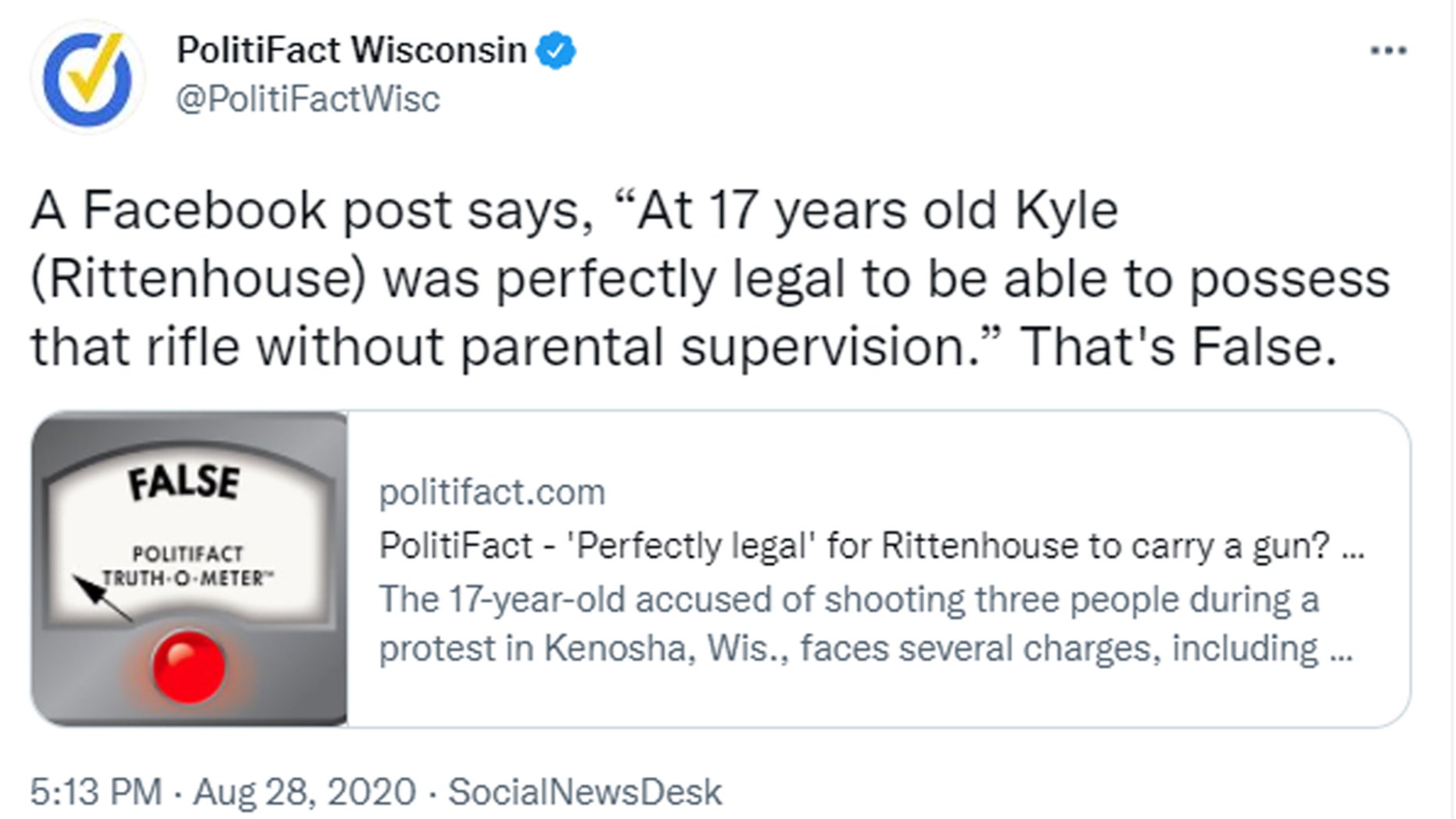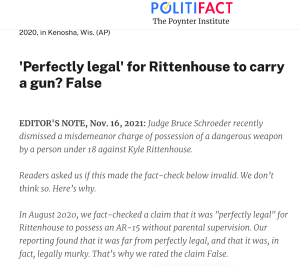The progress of the Kyle Rittenhouse trial has led to a great deal of criticism of the coverage of the mainstream media, which continues to downplay the weaknesses in the case. Yesterday, Judge Bruce Schroeder dismissed the sixth charge in the case. I recently wrote a column stating that the sixth count appeared to be based on a factually and legally inapplicable provision of Wisconsin law. I was mystified how the prosecutors could even secure the count in the first place. What is equally concerning is how Facebook intervened early to flag the questioning the charge and how Politifact declared such questions as presumptively “false” worthy.
What is most striking about the controversy is that it was started with just one random Facebook user on Aug. 27, 2020, writing “Carrying a rifle across state lines is perfectly legal, adding “Based on the laws I can find of this area at 17 years old Kyle was perfectly legal to be able to possess that rifle without parental supervision.”
Facebook then flagged the statement “as part of Facebook’s efforts to combat false news and misinformation on its News Feed.” It went to PolitiFact’s Daniel Funke who declared it as presumptively untrue.
‘The Wisconsin Department of Justice honors concealed carry permits issued in Illinois. But Rittenhouse did not have a permit to begin with, and he was not legally old enough to carry a firearm in Wisconsin …. Whether Rittenhouse violated Wisconsin law by possessing a firearm underage is the subject of ongoing litigation. But the Facebook post claimed that it was “perfectly legal” for the teenager to carry an assault-style rifle in Kenosha. At best, that’s unproven. At worst, it’s inaccurate. Either way, we rate the post False.’
The sixth count alleged the possession of a dangerous weapon by a person under 18. Under state law, minors are prohibited from such possession and this can constitute a Class A misdemeanor that carries a basic sentence of up to nine months in prison, a fine of up to $10,000, or both.
The problem is that the provision was facially inapplicable to this case.
Defendants are guilty of this offense if they possess a short-barreled rifle under Section 941.28. However, the prosecutors never put into evidence that this was a short-barreled weapon. Indeed, a police officer testified it was not. Rittenhouse used a Smith & Wesson M&P 15 with an advertised barrel length of 16 inches and the overall length is 36.9 inches. That is not a short barrel.
The only other way to convict under this crime is to show that “a person under 18 years of age who possesses or is armed with a rifle or a shotgun if the person is in violation of s. 941.28 or is not in compliance with ss. 29.304 and 29.593.” The defense conceded Rittenhouse was in violation of Section 29.593, which requires certification for weapons. However, he is not in violation of section 29.304, entitled “Restrictions on hunting and use of firearms by persons under 16 years of age.” As the title indicates, the section makes it illegal for persons under 16 to use firearms. Rittenhouse was 17 at the time and the prosecution has not challenged that fact.
The Politifact ruling shows how such determinations can be the result of one’s selection of “experts.” This was even more apparent in the Russian collusion investigation where media called upon the same experts who consistently supported an array of different criminal theories, often heralding “smoking gun” evidence against Trump.
However, the controversy particularly highlights Facebook’s use of “misinformation” to censor news and viewpoints. We have have been discussing how writers, editors, commentators, and academics have embraced rising calls for censorship and speech controls, including President-elect Joe Biden and his key advisers. Even journalists are leading attacks on free speech and the free press. This includes academics rejecting the very concept of objectivity in journalism in favor of open advocacy. Columbia Journalism Dean and New Yorker writer Steve Coll has denounced how the First Amendment right to freedom of speech was being “weaponized” to protect disinformation.
The result is that even a misdemeanor gun charge in a case in Kenosha must be flagged as potential misinformation in the management of information for the public.
Update: Politifact responded to the criticism:
The site insists that it was responding to the notion that it was “perfectly legal.” However, it was legal in the sense of not being a criminal act. The fact check simply declared such claims as false. It was not clearly false but, at best, a disagreement among experts. Again, I do not see how you can credibly argue that the possession was a crime. Politifact instead take a complaint by a Facebook user in suggesting that the criminal count was valid. Moreover, the legal analysis neglects to address fully the two basis for criminality in the possession of a small barrel weapon or the satisfaction of the two prerequisite statutory elements.
Reprinted with permission from JonathanTurley.org.




